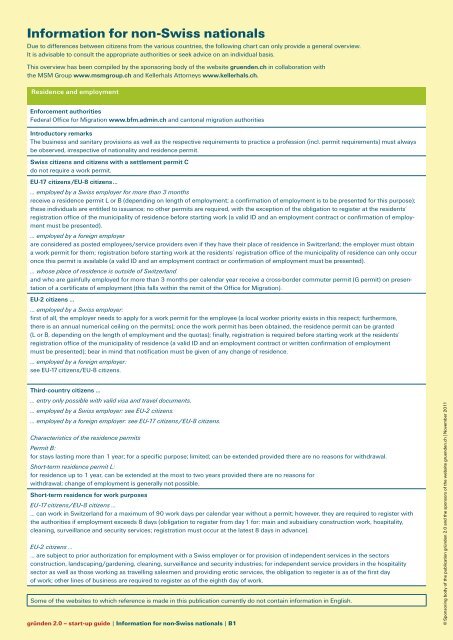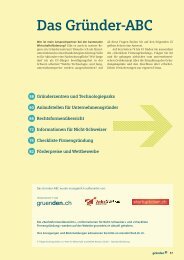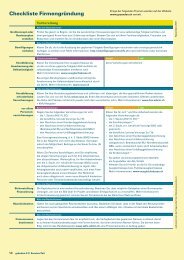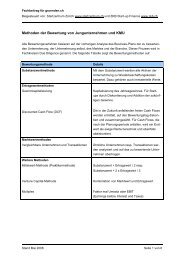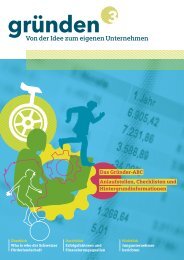gründen 2.0 start-up guide - Gruenden.ch
gründen 2.0 start-up guide - Gruenden.ch
gründen 2.0 start-up guide - Gruenden.ch
Create successful ePaper yourself
Turn your PDF publications into a flip-book with our unique Google optimized e-Paper software.
Information for non-Swiss nationals<br />
Due to differences between citizens from the various countries, the following <strong>ch</strong>art can only provide a general overview.<br />
It is advisable to consult the appropriate authorities or seek advice on an individual basis.<br />
This overview has been compiled by the sponsoring body of the website gruenden.<strong>ch</strong> in collaboration with<br />
the MSM Gro<strong>up</strong> www.msmgro<strong>up</strong>.<strong>ch</strong> and Kellerhals Attorneys www.kellerhals.<strong>ch</strong>.<br />
Residence and employment<br />
Enforcement authorities<br />
Federal Office for Migration www.bfm.admin.<strong>ch</strong> and cantonal migration authorities<br />
Introductory remarks<br />
The business and sanitary provisions as well as the respective requirements to practice a profession (incl. permit requirements) must always<br />
be observed, irrespective of nationality and residence permit.<br />
Swiss citizens and citizens with a settlement permit C<br />
do not require a work permit.<br />
EU-17 citizens/EU-8 citizens…<br />
… employed by a Swiss employer for more than 3 months<br />
receive a residence permit L or B (depending on length of employment; a confirmation of employment is to be presented for this purpose);<br />
these individuals are entitled to issuance; no other permits are required, with the exception of the obligation to register at the residents’<br />
registration office of the municipality of residence before <strong>start</strong>ing work (a valid ID and an employment contract or confirmation of employment<br />
must be presented).<br />
… employed by a foreign employer<br />
are considered as posted employees/service providers even if they have their place of residence in Switzerland; the employer must obtain<br />
a work permit for them; registration before <strong>start</strong>ing work at the residents’ registration office of the municipality of residence can only occur<br />
once this permit is available (a valid ID and an employment contract or confirmation of employment must be presented).<br />
… whose place of residence is outside of Switzerland<br />
and who are gainfully employed for more than 3 months per calendar year receive a cross-border commuter permit (G permit) on presentation<br />
of a certificate of employment (this falls within the remit of the Office for Migration).<br />
EU-2 citizens …<br />
… employed by a Swiss employer:<br />
first of all, the employer needs to apply for a work permit for the employee (a local worker priority exists in this respect; furthermore,<br />
there is an annual numerical ceiling on the permits); once the work permit has been obtained, the residence permit can be granted<br />
(L or B, depending on the length of employment and the quotas); finally, registration is required before <strong>start</strong>ing work at the residents‘<br />
registration office of the municipality of residence (a valid ID and an employment contract or written confirmation of employment<br />
must be presented); bear in mind that notification must be given of any <strong>ch</strong>ange of residence.<br />
… employed by a foreign employer:<br />
see EU - 17 citizens/EU-8 citizens.<br />
Third-country citizens …<br />
… entry only possible with valid visa and travel documents.<br />
… employed by a Swiss employer: see EU-2 citizens.<br />
… employed by a foreign employer: see EU-17 citizens/EU-8 citizens.<br />
Characteristics of the residence permits<br />
Permit B:<br />
for stays lasting more than 1 year; for a specific purpose; limited; can be extended provided there are no reasons for withdrawal.<br />
Short-term residence permit L:<br />
for residence <strong>up</strong> to 1 year, can be extended at the most to two years provided there are no reasons for<br />
withdrawal; <strong>ch</strong>ange of employment is generally not possible.<br />
Short-term residence for work purposes<br />
EU-17 citizens/EU-8 citizens …<br />
… can work in Switzerland for a maximum of 90 work days per calendar year without a permit; however, they are required to register with<br />
the authorities if employment exceeds 8 days (obligation to register from day 1 for: main and subsidiary construction work, hospitality,<br />
cleaning, surveillance and security services; registration must occur at the latest 8 days in advance).<br />
EU-2 citizens …<br />
… are subject to prior authorization for employment with a Swiss employer or for provision of independent services in the sectors<br />
construction, landscaping/gardening, cleaning, surveillance and security industries; for independent service providers in the hospitality<br />
sector as well as those working as travelling salesmen and providing erotic services, the obligation to register is as of the first day<br />
of work; other lines of business are required to register as of the eighth day of work.<br />
Some of the websites to whi<strong>ch</strong> reference is made in this publication currently do not contain information in English.<br />
<strong>gründen</strong> <strong>2.0</strong> – <strong>start</strong>-<strong>up</strong> <strong>guide</strong> | Information for non-Swiss nationals | B1<br />
© Sponsoring body of the publication <strong>gründen</strong> <strong>2.0</strong> and the sponsors of the website gruenden.<strong>ch</strong> | November 2011


